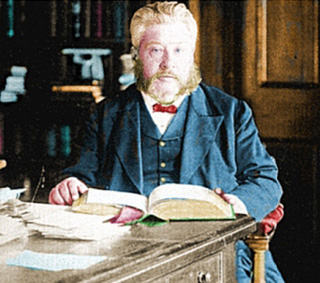 I’ve had nearly six weeks now in which I’ve no longer experienced the depression I was battling the prior two months, which I blogged about June 30. (See also part 2 of this Spurgeon series.) Like some physical problems I’ve had, I don’t know why the depression came or why it left. (Add this to my very long list of things I can’t explain.)
I’ve had nearly six weeks now in which I’ve no longer experienced the depression I was battling the prior two months, which I blogged about June 30. (See also part 2 of this Spurgeon series.) Like some physical problems I’ve had, I don’t know why the depression came or why it left. (Add this to my very long list of things I can’t explain.)
While in California, combining vacation and going over the screenplay for Deadline (see my previous blog post), God linked me with two men, one of them a pastor, who told me, on their own initiative, of their personal battles with depression.
Everyone’s experience is different, though there are commonalities. It’s also nice to know you’re not alone. And God is a master at taking us through things that allow us to encourage others. 2 Corinthians 1 speaks of “the God of all comfort, who comforts us in all our troubles, so that we can comfort those in any trouble with the comfort we ourselves have received from God…If we are distressed, it is for your comfort and salvation; if we are comforted, it is for your comfort, which produces in you patient endurance of the same sufferings we suffer.” The blog on thankfulness and not complaining was a reminder to me that whenever I’m relieved of a problem, I should be deeply grateful. The tendency is to just move on, and fail to express ongoing appreciation to God. Since the period of depression ended, I haven’t thought much about it. Every once in a while I’ll remember what those couple of months were like, and thank God for His deliverance. Truly we should count our blessings. Like grandson Matthew here, counting his new brother as a blessing.
The blog on thankfulness and not complaining was a reminder to me that whenever I’m relieved of a problem, I should be deeply grateful. The tendency is to just move on, and fail to express ongoing appreciation to God. Since the period of depression ended, I haven’t thought much about it. Every once in a while I’ll remember what those couple of months were like, and thank God for His deliverance. Truly we should count our blessings. Like grandson Matthew here, counting his new brother as a blessing.
1 Thessalonians 5:17 commands us “give thanks in all circumstances, for this is God’s will for you in Christ Jesus.” I just thanked God for the good health He’s given me, instead of focusing on the exceptions of a pancreas that no longer works, a sore arm, and aches and pains that come from playing tennis with eighteen year olds (I’m grateful to be out there with them).
Have you thanked God recently for a working pancreas? I never did. I took it for granted until my pancreas suddenly stopped working in the summer of 1985. How many blessings God gives us that we never thank Him for? And when He relieves our burdens, how soon we forget, and take things for granted.
After I had laser surgery on my eyes six years ago, I was filled with amazement and gratitude that I could get up during the night and in the morning and actually see clearly without glasses. But now I rarely think to thank him for that gift of vision. I did, just now. Thank you, my gracious Lord.
 Nanci and I love animals, and we take delight not only in Moses, but others we encounter. We think dogs were a particularly brilliant creation of God. Our daughter Angela is having a blast with Felix, a new add-on to their family. Felix came over to visit for a family gathering yesterday, and fit right in. He doesn’t compare to little Jack Franklin, grandson (who dominated the previous blog), but we also take pleasure in Felix, our first grand-dog.
Nanci and I love animals, and we take delight not only in Moses, but others we encounter. We think dogs were a particularly brilliant creation of God. Our daughter Angela is having a blast with Felix, a new add-on to their family. Felix came over to visit for a family gathering yesterday, and fit right in. He doesn’t compare to little Jack Franklin, grandson (who dominated the previous blog), but we also take pleasure in Felix, our first grand-dog.
God blesses us not just by relieving us of certain problems, but by giving them to us. In those few months of depression, I learned how the battle can foster deeper dependence on the Lord. I was acutely aware of being needy, and it made me seek His face and depend on Him more.
I don’t presume that the depression won’t return, but I’m thankful for the precious times I had with Him when I felt so intensely the need for His fellowship and friendship. He is so gracious, and I am so grateful. I’m also grateful for my precious wife Nanci, who understood and was completely supportive.
I have been encouraged by the perspectives of Charles Spurgeon, whose long-term struggles with depression were far worse than anything I’ve had to deal with. I was just reading one of his messages entitled, “When a Preacher Is Downcast.” Here’s how he begins:
Fits of depression come over the most of us. Cheerful as we may be, we must at intervals be cast down. The strong are not always vigorous, the wise not always ready, the brave not always courageous, and the joyous not always happy.
There may be here and there men of iron to whom wear and tear work no perceptible detriment, but surely the rust frets even these; and as for ordinary men, the Lord knows and makes them to know that they are but dust.
Knowing by most painful experience what deep depression of spirit means, being visited therewith at seasons by no means few or far between, I thought it might be consolatory to some of my brethren if I gave my thoughts thereon, that younger men might not fancy that some strange thing had happened to them when they became for a season possessed by melancholy; and that sadder men might know that one upon whom the sun has shown right joyously did not always walk in the light.
If you want to read the rest, see www.gotothebible.com/HTML/downcast.html. I’m a big Spurgeon fan, and if you haven’t read many of his messages, I think you’ll find there are truths in them far more powerful than you’ll find in most modern Christian books.
I may come back to Spurgeon’s insights in a subsequent blog. Meanwhile, let’s thank God for His kindness in all the things that aren’t wrong with us, and His gracious empowerment to get through all the things that are. And thank Him for His promise that one day He will make all things right, forever:
“He will wipe every tear from their eyes. There will be no more death or mourning or crying or pain, for the old order of things has passed away.” (Revelation 21:4)
Header photo: Rijksmuseum, CC0, via Wikimedia Commons





